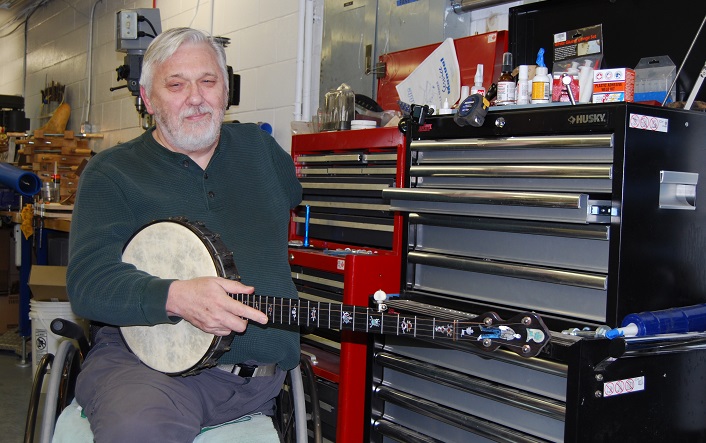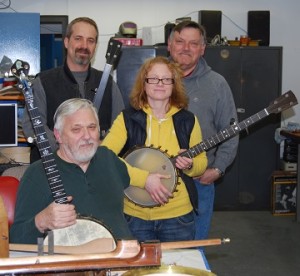|
The Auroran http://www.newspapers-online.com/auroran/bill-rickard-strikes-the-right-chord/ Export date: Thu Apr 18 23:52:09 2024 / +0000 GMT |
Bill Rickard strikes the right chord By Brock Weir Aurora's Bill Rickard is someone who has repeatedly defied the odds. It was little over 10 years ago that the owner of General Conveyors was on a European trip combining business with pleasure when in Italy on a motorcycle excursion he was hit head-on by an oncoming truck. It sheared his left arm clear off and later necessitated the amputation of his right leg. He maintained consciousness almost through the whole process, so the memories of the accident are vivid, but after eventually blacking out when the ambulance arrived, he was taken to a small country hospital before being airlifted out to a larger facility and eventually back to Canada. “The first surgeon who saw me worked like hell to keep me alive and I found out that the surgeon later went home and found out his 20 year old son had been in an accident and hit a man on a motorcycle,” recalls Mr. Rickard. “He didn't know that at the time. The accident cracked my chest to my heart, ripped all the arteries, cut all the arteries in my legs, so I was bleeding to death. They said my jacket basically held me together and they had never had anyone live with so much blood loss and come out of it.” From that point on in his recovery, he continued to defy all expectations. Mr. Rickard took over General Conveyors, the Aurora-based manufacturing company now located on Engelhard Drive, as a family business following the death of a relative, but however successful that venture was, his original passion had been music. As the business flourished, however, this passion eventually subsided in favour of the factory, but never actually faded away. It started when 66-year-old Mr. Rickard was a teen. He wanted to play the guitar but couldn't afford one, so his carpenter father suggested he build one; advice he followed. From there, he started building electric guitars with solid bodies, then acoustic guitars, a mandolin or two, and then he started playing the banjo. He needed something to play, so he put his creativity to the test to build and string one from scratch, and it was love at first strum. After joining the family business in his 30s, he no longer really had time to pursue his hobby, but by his late 40s, the interest started to creep back, taking lessons from famed Aurora-based banjo player Arnie Naiman. From there, he practiced two hours a day straight through until his accident at 57. “Sunnybrook said I would never walk again,” he said. “I have a prosthetic leg, so I can get around but it becomes a bit of a hassle. They said, ‘by the way, you're not going back to work,' but within a year I was back at my business [but in hospital] I was drugged up, disoriented, thinking this only happens to other people in your life but never to you, but unfortunately it does. “There, I would wake up and somebody would be playing the banjo or would be playing the guitar for me and word got out in the community that I had this terrible accident and I was getting cards from people I didn't even know. Instead of flowers, I got a bouquet with harmonicas because you only need one arm to play the harmonica!” But when he did eventually get back into his business, that same passion just wasn't there. Eventually he decided to turn what was then just a small part of his factory from its previous purpose to making all the parts necessary for banjos. Since then, he – and eventually his small army of equally passionate people – have turned the humble hobby into an international business leader in banjo construction, pioneering new techniques and styles of instruments, but also maintaining some of the more traditional makes, models, and materials. It has steadily grown and Mr. Rickard predicts that with the next year or two much of their operations will be devoted solely to making the parts that make the banjo an instrument continuing to grow in popularity. With his existing team, Mr. Rickard builds about 200 banjos a year. He concedes, of course, that trying to re-learn to build the instrument he loved with just one arm was a steep learning curve, but necessity is the mother of invention and he has figured out new techniques that in some cases have streamlined a few things here and there. With the renewed and growing popularity of the instrument, however, there is nowhere to go but up, he said. “The U.S. has had a huge resurgence,” he says, citing bands like Mumford and Sons who have made banjos part of their regular repertoire. “You can go through Flatt and Scruggs and bluegrass, and now old time music has come on, but young people have really gotten into it.” Since his accident, however, banjo making has gone far beyond a simple hobby or a new business interest. “Out of all the business people I knew, maybe only a handful of people came to see me in the hospital,” says Mr. RIckard. “That affects you mentally. I think people in the arts and music are probably more compassionate and it is just something about your makeup. Maybe some people in business didn't know how to react. I tried this, didn't think I would be able to do it, but it worked. If it hadn't, I probably wouldn't be sitting here right now. I wouldn't be alive. I was in bad mental shape and now I wake up every morning and get annoyed because I have paperwork to do, but I would rather be back here building banjos!” |
|
Post date: 2013-03-26 12:09:50 Post date GMT: 2013-03-26 16:09:50 Post modified date: 2013-04-02 13:40:28 Post modified date GMT: 2013-04-02 17:40:28 |
|
Export date: Thu Apr 18 23:52:09 2024 / +0000 GMT This page was exported from The Auroran [ http://www.newspapers-online.com/auroran ] Export of Post and Page has been powered by [ Universal Post Manager ] plugin from www.ProfProjects.com |
